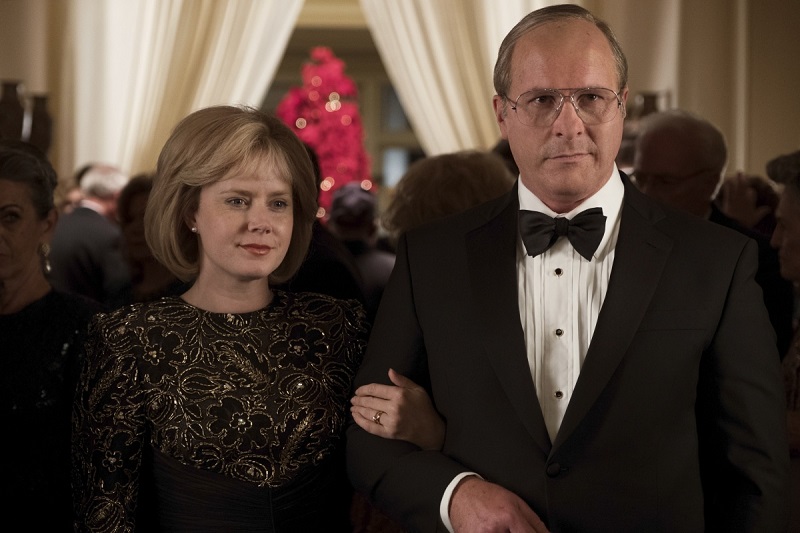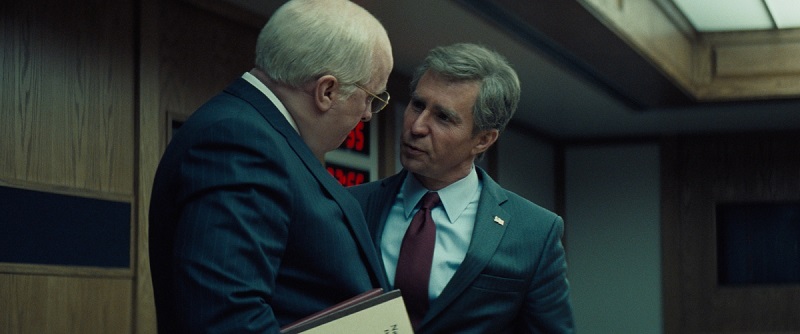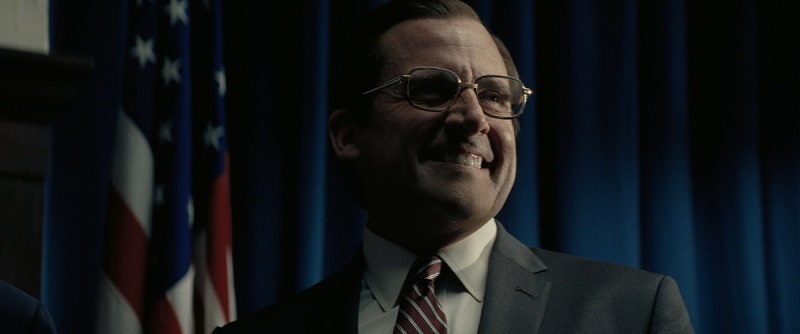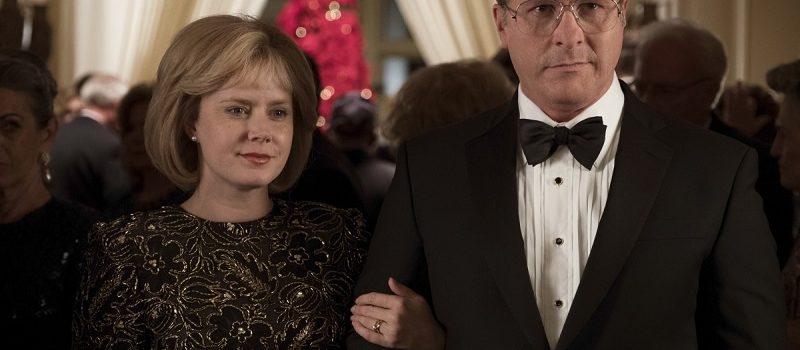Adam McKay issued a scathing indictment with how the government and Wall Street handled the fiscal crisis of 2008 in his The Big Short. With Vice, he’s pointing his pointed camera at another criminal endeavor—how Vice President Dick Cheney transformed the office of the Vice President and changed government forever.

Christian Bale is Cheney and his transformation is nothing short of a movie miracle. Bale’s characterization takes the former Vice from lost youth working the power lines across Wyoming during the day and drinking away his nights, to one of the most powerful people in the history of the United States.
One of the things that we learn about Cheney is that his wife Lynne (Amy Adams) was a huge driving force that turned him from aimless to absolutely powerful. She’s quite the power-hungry individual as well, as she served as President Reagan’s Head of NEH, where she slashed that organization’s budget. Adams, like Bale, delivers a spot-on take on the famous figure, while simultaneously never making it an imitation. Instead, they both deliver a three-dimensional performance.
The other standout in this ensemble is the “he’s everywhere now,” Steve Carell as future Secretary of Defense Donald Rumsfeld. That’s another thing learned in Vice, Cheney used to intern under Rumsfeld and they were attached at the hip throughout their rise to power, from Nixon to Reagan’s White House. At some point, the student became the teacher. That’s some classic Shakespearian palace intrigue here folks, not something one would expect from a participatory democracy. But I am getting ahead of myself.
As evidenced by the Vice trailer, the way McKay tells his tale is not far off from farce. After all, this is the guy who directed Anchorman and Talladega Nights. Some may feel that it is an odd thing to find humor in the story of a man who many believe is a war criminal at the least and at the most, someone who profited as a “company man” steering a ton of lucrative Iraq war contracts to Halliburton, i.e. making money off of the deaths of 4,000 American heroes and hundreds of thousands of Iraqi civilians.
The thing about humor is it is an effective means to deliver tough truths. There can be no tougher truths than telling a spin-free tale of Cheney, his ascent to power, his manipulation of the system (and George W. Bush for that matter) and his ability to work behind the scenes his entire career in a way that made him powerful and wealthy beyond belief. For example, there is a scene in the moments after those planes crashed into the Twin Towers. Cheney is making all kinds of decisions on the fortified situation room, deep underground in the White House. He is keeping President Bush airborne on Air Force One, due to the “potential there are more planes ready to attack.” Cheney also authorized the military to shoot down any unaccountable civilian aircraft… all without the permission of the president.
At one point, Rumsfeld asks Cheney, “Can you do that?” He responds, “I just did.” That’s Cheney’s take on his role as someone who is supposed to be the subordinate of the President of the United States. It’s also indicative of Cheney’s view on the role of the Executive Branch in the U.S. Government, something McKay lays out brilliantly throughout Vice.
Vice does a stellar job of painting Cheney as someone who always advocated that power should be centralized. Of course, we all know that goes against the pillars of a democracy. The founders put in a checks and balances system to avoid any form of autocratic ruling. After all, they were reeling from a monarchy that ruled over the colonies with an iron fist. It’s difficult watching those moments were Cheney is exploiting his position as Vice President and seeing his theories of a stronger executive branch become reality.
There’s another scene in the Vice trailer, again, that also aids us in understanding the position of McKay in telling this story. When then-candidate Bush is asking Cheney to be his “Vice,” Cheney informs the future 43rd president that from where is standing, the position of VP would be a step down. He’s the CEO of a giant corporation that makes billions of dollars. He’s been White House Chief of Staff, Secretary of Defense and a few other positions that would make someone believe that the largely symbolic role of VP is not appealing. Yet, with some alterations to expectations of him as VP, he and Bush could become a team. Cheney sought to take over overseeing the military. Um… isn’t that the president’s job, aka the Commander in Chief? He also wanted to manage the government bureaucracy, handle foreign relations and energy. That is exactly what Cheney did, for better or worse. Ah, who we are kidding? It was all worse and set a precedent that finds us in the position we are in currently with a government in chaos.
That air of levity that McKay has employed with Vice pays off handsomely. There is a lot that the filmmaker jams into a two-hour movie that is an explosive indictment of the former VP that never feels pointed or jaded. The film is wildly entertaining, vividly enthralling and above all else—extremely enlightening. Whether you like the man or not, it does not matter. The film plays extremely well as a rich personality study. One that presents its facts in the most direct and—believe it or not—unbiased and kinetic method.

Often, biopics can be a tad on the long side. It’s the supremist of challenges to tell a life that is decades in the making in just around two hours. Therefore, filmmakers feel they have license to go long, figuring that audiences want the entire tale and not an abridged version.
Somehow, McKay keeps his film decidedly concise at two hours and 12 minutes. Vice really moves. There are no lulls. The film manages to check all the boxes a biopic should tick. There is even time for developing an emotional connection with the characters—love them or hate them—that is undeniable.
For example, when Cheney lands an office inside Nixon’s White House, he phones Lynne and the two have a moment that any couple can identify with—they’ve finally “made” it. Forget the criminal that he was working for, or the criminal he would become. There is not a soul witnessing the film that cannot commiserate with that phone call between spouses when the family gets some good news and a dream is achieved. There is plenty of that in Vice. McKay sacrifices nothing to get his point across and still tells a tale of one man’s rise to power in a country that he, no question, loved.
What is missing, it may seem, is any similar type of indictments of Cheney’s “boss,” George W. Bush.
As McKay plays it, Bush was an unwilling, and honestly unaware, lapdog that the VP played like an accordion. I recall the talk when rumors were swirling that Cheney would be Bush’s pick. The reason many pundits thought it was a good move was that he filled in the blanks on Bush’s resume. The former Texas governor lacked foreign policy and inside D.C. history and he got all of that with Cheney. What we didn’t know at the time, was that Cheney was positioning himself to achieve his own political, business and personal goals at the expense of a president who simply did not have an idea of what he was agreeing to during that fateful lunch where Cheney agreed to be Bush’s “second” in command. Bush was no patsy, don’t get me wrong. He had to agree with what his Vice was doing or it never would have become the law of the land, or the policy of the United States. In McKay’s mind, Bush was a moldable soul for Cheney and that—above all else—was the biggest appeal in saying yes to becoming his VP. The 43rd president doesn’t get off Scott-free. He ushered in the Iraq war through blind trust in the information he was getting from his VP and the foreign policy people who answered to the Vice President’s office and not the president, as is usually the case.
Rockwell plays Bush as such—slightly aloof, incredibly folksy and someone who truly believed what the people around him were saying, even if the truth was somewhere on the moon and nowhere near the words coming out of Cheney and Rumsfeld’s mouths. The Oscar winner for Best Supporting Actor last year (for Three Billboards) is up for that category yet again, what with his Golden Globe nomination for the role. Rockwell can do no wrong in my book. It’s fantastic to see him get another opportunity to showcase his gifts in Vice—hopefully the Academy will come knocking again.

Carell loses himself in the role of Rumsfeld and he has one heck of a character arc. After all, as we stated prior, Cheney started as the student to Rumsfeld’s mentor. When the roles switched as Cheney became VP, Rumsfeld was often put in his place and Carell portrays that evolving relationship impeccably. Who knew when he left The Office, that the actor would become one of our most mailable thespians working today? Only someone of that type of powerful talent could command our attention while sharing a scene with the bombastic brilliance of Bale.
The man who was Batman turns in another earth-shaking performance. This time the British performer tackles an American institution that is Cheney, Inc. There are moments where it feels a bit impersonation-ish, but we’re talking about one of the more recognizable and powerful Vice Presidents in U.S. history and that is unavoidable. There is a real soul there that Bale brings through and his motivations are never far from the surface—at least for the audience. The press, his boss (the president!) may have never been able to tell. But through Bale’s latest stroke of genius, Cheney comes alive in a manner that delivers what McKay sought to achieve from his screenplay—a searing portrait of a man who changed the world for worse (or better, depending on your political views) in a way that we are still feeling to this day.
McKay has done it yet again. The man who became a household name from helming Will Ferrell (and others) comedies is becoming like a Mark Twain of our time. Twain had a way of showcasing the ills of society of his time in a way that was humorous, entertaining and also insanely pointed in its blame. McKay does the same thing in the same way. Try watching The Big Short and not laugh throughout, yet still conclude the experience ready to wag your finger and place blame on those one-percenters and Republicans in government who cost this country billions. The auteur achieves similar goals in Vice—only more so. What Cheney did resulted in the tragic deaths of thousands of heroic Americans who thought they were fighting a battle for democracy and instead were giving Halliburton and other corporate friends of Cheney an endless influx of cash, prestige and above all else—access to power.
Grade: A

